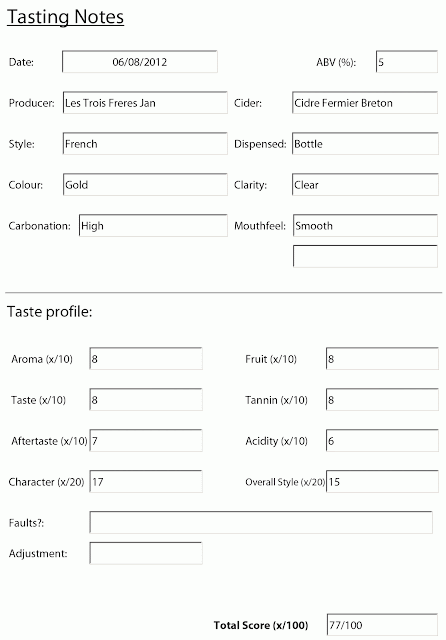Hello from a pilgrim on a journey to try as many different ciders as possible; enjoy them, write about them and see how many really fine ciders there are.
Thursday, 11 October 2012
Les Trois Freres Jan Cidre Fermier Breton
As with all the other cidre being reviewed here at the moment, this one came from way outside of its home region. In some ways this is a good thing: as with the UK there must be brands that are national, and some that are supplied around France. In the same way as in the UK, however, these brands are proving to be stabilised, safe products on the whole. The bottle I now have before me doesn't even have a little round sticker, which I am not entirely sure means anything other than it doesn't have a sticker. Mind you, it has been selected for 'La Selection Fouconnerie'. My guess is that this is similar to the 'Itineraire' cidre I tried earlier in the week.
Looking into the bottle, I can see a very small trace of yeast at the bottom. Often the way of producing this kind of cidre is to restart a small fermentation using champagne yeast, which is finer and easier to disgorge than natural cider yeast. However, what happens during that process is a bit of a mystery to me. I suspect filtering and pasteurisation may be involved - although what is the point of pasteurising if you are just going to restart a fermentation? Most French cidre is never allowed beyond 4.5-5%, which means that there is still plenty of sugar left in the bottle. This is often why cidre tastes sweet. It is naturally so. And if you are into really sweet cider then go for a 'doux' version. These will usually be 2-3% at most and retain a sweet juicy taste. Not my thing, but then.
After a little digging around it turns out that this is a cidre produced by Château de Lézergué, from Ergué-Gabéric - well into Breton. The website is worth a look if you are planning to visit the region as it seems as though they have quite a selection: http://www.chateau-lezergue.com/
OK, on with the tasting. Right from the opening you can tell this is slightly different. It is certainly different from the Normandy cidre (and, to be honest, from the other supermarket Breton cidre too:-) It has a more rugged smell to it - more tannic and harsher (I know what I mean and its not a bad thing!).
The tannin and body do play a much bigger role in this cidre - it is less like fresh apple juice and more west country in style (albeit with a big fizz). The tannin is still pretty mild and not drying. There is little acidity to speak of, although it suits this cidre pretty well. Certainly it is less refined than its Norman counterparts... this makes a refreshing change to be honest.
The aftertaste is moderate to long and is mainly fruit.
One other thing to say, in terms of the 'roughness' - I think it is slightly astringent too. This is a feature of Spanish sidra but I wasn't expecting it with a French cidre. Maybe I am misreading it though (and is not at all unpleasant).
In all, a well deserved bronze apple with a score of 77. Things are looking up:-)
Subscribe to:
Post Comments (Atom)



No comments:
Post a Comment